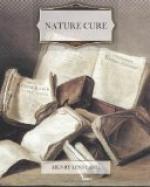Chapter XXXIX
HOW SHALL WE PRAY?
Shall we say: “Father, give me this Father, do for me that!”? Or shall we say: “Behold, I am perfect! Imperfection, sin and suffering are only errors of mortal mind!”?
Or shall we pray: “Father, give me of Thy strength that I may live in harmony with Thy law, for thus only will all good come to me!”?
The first way is to beg, the second, to steal, the third, to earn by honest effort.
“Father, give me this!”—“Father do for me that!” Thus prayed our fathers, not understanding the great law of compensation, the law of giving and receiving, which demands that we give an equivalent for everything we receive. To receive without giving is to beg.
The lily, in return for the nourishment it receives from the soil and the sun, gives its beauty and fragrance. The birds of the air give a return for their sustenance by their songs, their beauty of plumage, and by destroying worms and insects, the enemies of plants and men. Every living thing gives an equivalent for its existence in some way or other.
With Man, the fulfillment of the law of service and of compensation becomes conscious and voluntary, and his self-respect refuses to take without giving.
“Behold, I am perfect! Imperfection, sin, and suffering are only errors of mortal mind!” Such is the prayer of certain metaphysical healers.
To assume the possession of goodness and perfection without an earnest effort to develop and to deserve these qualities, means to steal the glory of the only Perfect One. The assumption of present perfection precludes the necessity of striving and laboring for its attainment. If I am already all goodness, all love, all wisdom, and all power, what remains for me to strive for?
Herein lies the danger of metaphysical idealism. While it may dispel pessimism, fear, and anxiety, it inevitably weakens the will power and the capacity for self-help and personal effort.
The ideal of the metaphysician is the ideal of the animal. The animal does not worry about right or wrong, nor, with few exceptions, does it make provision for the future. Its care and forethought extend only to the next meal. But this perfect, ideal, passive trust in Nature’s bounty causes the animal to remain animal and prevents its rising above the narrow limitations of habit and instinct.
The inherent faculties, capacities, and powers of the human soul can be developed only by effort and use. The savage, living in the most favored regions of the earth, depending for his sustenance in perfect faith and trust on Nature’s never-failing bounty, has remained savage. Through ages he has risen but little above the level of the beasts that perish.
The great law of use ordains that those faculties and powers which we do not develop remain in abeyance, and that those which we possess weaken and atrophy if we fail to exercise them.




